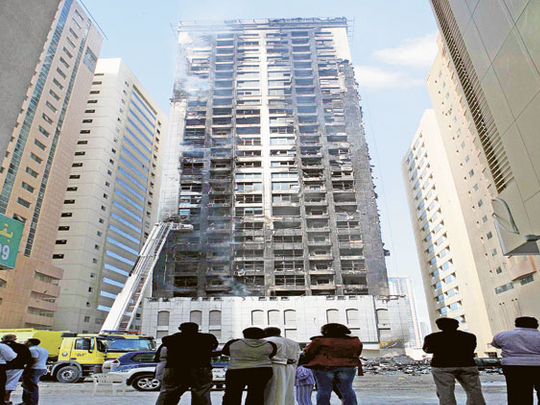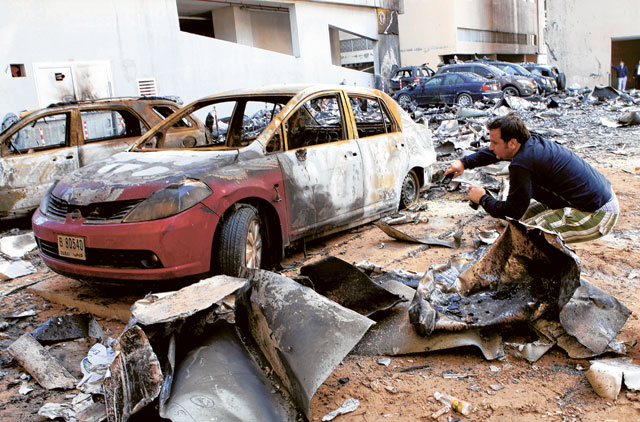
Many UAE residents have suffered financial difficulties in times of disasters partly because they did not take out home insurance.
Just recently, more than 100 families in Al Baker Tower 4, a high-rise residence in the Al Taawun area on the Dubai-Sharjah border, were driven from their homes and suffered irrecoverable losses after a huge fire gutted their building. The victims said they lost everything and are starting from scratch again.
Of the 125 displaced households, more than 50 have already been identified for emergency grant funds of up to Dh50,000 each, but only those living in the most seriously damaged rear of the building may be eligible.
Palestinian expatriate Mohammad Alsaleh, 40, who was forced to flee his flat 204 estimates he lost about Dh150,000 worth of personal belongings in the fire. Like most other tenants in the building, he did not have home insurance. "I thought the owner had insurance for all of us," Al Saleh said in an interview. His flat was one of the first apartments to be hit by flames licking the building from below on the first floor, where the blaze is believed to have started.
He, however, urged everyone in the UAE who rents a flat to make sure they secure their own insurance for peace of mind. He suggested that landlords could make it standard practice to advise tenants of the need for personal insurance.
Landlords could even help by demanding proof of insurance before renting apartments. "It might be a good idea to put home insurance on top of the rent so that we are protected," said Al Saleh. "Paying an extra Dh300 or Dh500 for this insurance is not much for all year."
Water damage
Feras Halab, who lived in apartment 901, said his flat and its contents suffered heavy smoke and water damage to the tune of roughly Dh35,000. Going through the fire nightmare has taught him an extremely valuable lifelong lesson that he will never forget.
"Before, we just didn't think about it [home insurance]. Today, it is different. I agree that everyone needs home insurance, especially after what happened to me," Halab said. "It is important because I've learned that you never know when bad accidents will happen."
Alam Khayal, another resident in the same building, also suffered serious smoke and water damage to his possessions in apartment 1403 and said he will never rent again without securing the proper insurance. "This is a must for me now, you never know what will happen," Khayal said.
Apparently, the displaced families in Sharjah are not the only ones overlooking the need for insurance. Only about 1 to 3 per cent of the UAE population has home insurance, because not many people are aware that it is their responsibility to insure their household contents and personal belongings.
"The penetration rate for home contents insurance certainly is very low in the UAE. The reasons for low take-up are many. Partly because this insurance is not mandatory, sometimes it's cultural, and sometimes it's because people plan to be here for a short time only and rent rather than buy," said Niall Husbands, regional head of wealth management, retail banking and wealth management, at HSBC Middle East and North Africa.
Back seat
David Harris, sales and marketing director of Royal and Sun Alliance (RSA) said that market penetration rate for home insurance in the UAE is not more than 3 per cent. "As we know, the UAE has a huge expatriate population.
When they arrive, they have a lot on their minds—a job to think about, a house to rent, a car to buy and many other things. As a result, it's the home insurance that tends to take the back seat," he says.
There are two types of insurance plans that cover fire damage. A property insurance policy provides protection for the structure itself and is often required among property owners. It does not provide any kind of protection for the contents of the villa or apartment.
A home policy, on the other hand, offers financial protection against any loss or damage to appliances, furniture, cash, jewellery and other valuables during a fire. "Losing or damaging your personal property is not just distressing but also inconvenient," Harris says.
According to Anand Majmudar, associate manager of Gargash Insurance, a home policy doesn't directly provide a temporary accommodation, but the tenant can certainly use the insurance payout to shoulder the cost of alternative housing if they are driven from their apartments.
"Certain policies will also allow for the loss of rent or cost of temporary alternative accommodation," he says. Taking out a home policy does not cost a fortune. For example, RSA offers home insurance for as little as Dh250, or roughly Dh21 per month.
Majmudar says a policy normally costs 0.4-0.5 per cent of the value of the normal unspecified contents, including furniture and other household items. For valuables or personal belongings such as jewellery, paintings, exclusive artifacts, the premium can cost 1.4 to 2 per cent of the insured items' value. "It is very important to select a plan that is an accurate estimate of the value of the items insured," says Husbands.
HSBC's standard cover, for example, goes up to Dh450,000 for contents and Dh75,000 for personal belongings. At other insurers, a Dh416 annual premium will pay back up to Dh100,000 for the contents and personal belongings in the home.









